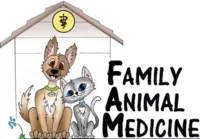Epilepsy (often referred to as a seizure disorder) is a chronic neurological condition characterized by recurrent unprovoked seizures. It is commonly controlled with medication, although surgical methods are used as well. Epileptic seizures are classified both by their patterns of activity in the brain
Read more-
Epilepsy
Category: Pet Health, Chronic Conditions
-
Seizures
Category: Pet Health, Chronic Conditions
Seizures are common in dogs, but more unusual in cats. Seizures are just symptoms which can occur with many kinds of diseases. They can happen because of diseases outside the brain or inside the brain. Low blood sugar that can happen with an overdose of insulin or with a tumor of the pancreas can cause
Read more -
Vertigo or Old Dog Vestibular Syndrome
Category: Pet Health, Chronic Conditions
Vertigo is a syndrome in the elderly dog, which can be very frightening to the owners. The dog is suddenly afflicted with a balance problem, usually staggering, but occasionally unable to stand, and more rarely actually rolling over and over. There is a tilting of the head to one side and nystagmus,
Read more -
Obesity
Category: Pet Health, Chronic Conditions
Excess weight is a serious health problem for dogs and cats and is common in many countries. The two main causes of obesity are too much food and too little exercise. Other contributing factors can be due to hormonal influences, certain genetic factors, and other disease processes. If you pet is carrying
Read more -
Cancer
Category: Pet Health, Chronic Conditions
Cancer, by definition, is the uncontrolled growth of cells. Any type of cells in the body can become cancerous. Once these cells grow out of control, they take over areas previously occupied by normal cells; sometimes these tumor cells break off and travel to other areas of the body. Wherever these cells
Read more -
Hypothyroidism
Category: Pet Health, Chronic Conditions, Pet Health
Hypothyroidism is the natural deficiency of thyroid hormone and is the most common hormone imbalance of dogs. This deficiency is produced by several different mechanisms. The most common cause (at least 95% of cases) is immune destruction of the thyroid gland. It can also be caused by natural atrophy
Read more -
Liver Shunt
Category: Pet Health, Chronic Conditions
A liver shunt is also named a PSS, portosystemic shunt, portacaval shunt or portosystemic vascular anomaly. This abnormality occurs when a pet's venous blood from the intestine bypasses the liver. In the normal pet, blood vessels pick up nutrients from ingested material in the intestine and carry it
Read more -
Diabetes Mellitus
Category: Pet Health, Chronic Conditions
Diabetes Mellitus (DM) is a life long disorder of dogs and cats that results when the pancreas fails to produce enough insulin to meet the animal's needs. Insulin is a hormone needed to transport glucose (blood sugar) into the body's cells. When there is a lack of insulin in the body, blood glucose rises
Read more
Location
Find us on the map
Office Hours
Monday:
8:00 am-6:00 pm
Tuesday:
8:00 am-6:00 pm
Wednesday:
8:00 am-6:00 pm
Thursday:
8:00 am-6:00 pm
Friday:
8:00 am-6:00 pm
Saturday:
8:00 am-1:00 pm
Sunday:
Closed


